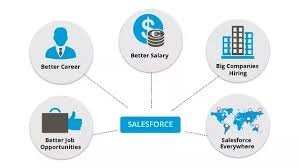Salesforce Career Crossroads: Should You Stay a Developer or Move to Admin?
Choosing between staying as a Salesforce Developer or transitioning to a Salesforce Admin is a significant career decision for professionals in the Salesforce ecosystem.

Choosing between staying as a Salesforce Developer or transitioning to a Salesforce Admin is a significant career decision for professionals in the Salesforce ecosystem. This decision depends on your interests, long-term goals, and preferred work environment. In this article, we’ll explore the differences, benefits, and considerations of each role to help you make an informed choice.
Understanding the Roles: Salesforce Admin vs Developer
To begin, it’s essential to understand the core responsibilities and skills required for both roles:
Salesforce Admin:
-
Focuses on managing and configuring Salesforce environments.
-
Handles user management, security settings, and workflow automation.
-
Works closely with stakeholders to gather requirements and ensure smooth platform usage.
Salesforce Developer:
-
Specializes in writing code and building custom solutions using Apex, Visualforce, and Lightning Web Components (LWC).
-
Focuses on creating complex customizations, integrations, and data models.
-
Collaborates with admins and business analysts to implement advanced features.
Key Differences Between Salesforce Admin and Developer
Skillset and Technical Expertise
-
Admin Role: Requires a deep understanding of Salesforce configuration tools such as Process Builder, Flow, and Reports/Dashboards. A basic knowledge of coding is a plus but not mandatory.
-
Developer Role: Involves programming knowledge of Salesforce-specific languages like Apex and SOQL as well as experience with frameworks like Lightning Web Components.
Problem-Solving Approach
-
Admin: Focuses on solving problems with built-in Salesforce tools and ensuring users can efficiently utilize the platform.
-
Developer: Tackles challenges requiring technical coding and architectural solutions, often involving integration with external systems.
Career Growth Opportunities
-
Admins often transition into roles like Salesforce Consultant, Solution Architect, or CRM Manager.
-
Developers can advance to positions such as Technical Architect, Integration Specialist, or CTO in technology-driven organizations.
Pros and Cons: Salesforce Admin vs Developer
Pros of Staying as a Salesforce Developer:
-
High Demand: Organizations constantly seek developers to customize and extend their Salesforce implementations.
-
Lucrative Pay: Developers typically command higher salaries due to their technical expertise.
-
Creative Freedom: You get to design and implement unique solutions tailored to specific business needs.
-
Global Opportunities: Developers often find remote work opportunities and freelance projects, broadening their career scope.
Cons:
-
Requires ongoing learning to keep up with platform updates and coding best practices.
-
May involve longer working hours during complex projects.
-
High-pressure environment during deployment and troubleshooting phases.
Pros of Moving to Salesforce Admin:
-
Broader Business Impact: Admins often work directly with stakeholders, making visible contributions to business processes.
-
Easier Learning Curve: Becoming an admin requires less technical expertise compared to development.
-
Job Stability: Admins are indispensable for daily Salesforce operations.
-
Collaborative Role: Working closely with various departments, admins gain a deeper understanding of business operations.
Cons:
-
Limited scope for advanced customizations compared to developers.
-
Pay scales may be lower than those of developers.
-
Repetitive tasks like user management and report generation may feel monotonous over time.
Is Salesforce Admin vs Developer Decision Right for You?
Consider Your Interests:
-
If you enjoy coding, problem-solving, and building software solutions, staying as a Salesforce Developer may be the better fit.
-
If you prefer working with users, configuring systems, and focusing on operational efficiency, consider becoming a Salesforce Admin.
Assess Your Career Goals:
-
Do you aspire to lead technical teams or design enterprise-level systems? Developer roles offer a clearer path to advanced technical leadership.
-
Are you drawn to working closely with business teams and improving day-to-day processes? Admin roles align well with this trajectory.
Evaluate Market Trends:
-
The Salesforce ecosystem continues to grow, creating ample opportunities for both admins and developers. Research local job markets to see which role aligns with your growth potential.
-
Consider the emergence of automation tools that could impact admin roles and the rising demand for developers skilled in AI and machine learning integrations.
Tips for Making the Transition
For Developers Moving to Admin:
-
Gain Business Knowledge: Understand how Salesforce supports various business processes, such as sales, service, and marketing.
-
Master Declarative Tools: Learn tools like Flow Builder, Process Builder, and Report Creation to enhance your admin skills.
-
Get Certified: Earning certifications like Salesforce Certified Administrator will validate your expertise and open new opportunities.
-
Engage with the Community: Join Salesforce user groups and forums to stay updated on admin best practices.
For Admins Moving to Developer:
-
Learn Coding Basics: Familiarize yourself with Apex, SOQL, and JavaScript.
-
Build Projects: Practice developing custom apps and integrations to enhance your skills.
-
Pursue Developer Certifications: Credentials like Platform Developer I and Platform Developer II demonstrate your capabilities.
-
Leverage Trailhead: Salesforce’s learning platform offers guided trails to help admins transition to developer roles.
The Financial Perspective
One important factor to consider is salary potential. Developers generally earn higher salaries compared to admins due to the technical nature of their work. However, experienced admins in strategic roles, such as Salesforce Consultants or Solution Architects, can also achieve lucrative compensation. Research salary trends in your region to make an informed decision.
Conclusion:
Deciding whether to stay as a Salesforce Developer or move to an Admin role depends on your interests, skills, and long-term career aspirations. Both roles offer significant growth opportunities within the Salesforce ecosystem. By evaluating your strengths and aligning them with market demands, you can choose the path that’s right for you.
What's Your Reaction?

















.jpg)
.jpg)